Croatians Miss Socializing, Travel, and Coffee (Of Course)
May 10, 2020 — The coronavirus pandemic took a toll on a culture used to informal gatherings, family meals, and hours spent philosophizing over a single macchiato. Croatians miss socializing, excursions and trips, and coffee in cafes, according to a recent poll gauging the general mood during the pandemic.
A survey conducted in early May by the Hendal Agency and Franck showed Croats citizens missed spending time with loved ones the most (78 percent), trips and travels (48 percent), and drinking coffee in cafes (44 percent).
The coronavirus epidemic has negatively affected 87 percent of citizens, mostly the inhabitants of Dalmatia, especially emotional life. The last few months since the epidemic upended daily live caused dissatisfaction in 53 percent of respondents. Others felt anger (29 percent) and sadness. (29 percent).
For men, the epidemic mostly caused boredom, for women, sadness. As many as 34 percent of citizens, primarily men, state that the epidemic and restrictions that came with it have caused boredom in their daily lives, while 28 percent felt lonely. Sadness also took hold, especially emphasized by women who took part in the poll.
About a third of respondents (34 percent) try to maintain a positive attitude and hope that life will return to normal soon.
That Croatian citizens are looking forward to the easing of restrictive measures and the reopening of cafes and terraces is shown by the 47 percent who said they will visit a cafe next week to drink a coffee, while a third say they will wait until the pandemic blows over completely. Dalmatians especially are looking forward to drinking coffee in cafes, with 65 percent saying they will first order coffee when they finally sit down at a cafe.
The crisis caused by the coronavirus did not have a significant impact on the habits of 63 percent of citizens when it comes to coffee drinking rituals, as evidenced by the 66 percent of citizens who normally have the habit of visiting cafes and will continue this habit after the epidemic ends.
During the restrictions, 47 percent of coffee lovers said coffee remained a part of their daily ritual. Only the place where they drank changed.
Hendal's earlier research, also conducted in collaboration with Franck, in October last year showed that Croatia is a country of coffee drinkers and "let's go for coffee" is still by far the most common invitation to socialize among Croats, with 87.5 percent using it as an excuse to socialize.
The most popular types of coffee are ground Turkish coffee and espresso in a cafe that is drunk by almost 70 percent of respondents. When coffee is mentioned, 28 percent of citizens cite morning as the first association, 16 percent waking up, 15 percent think of its smell.
New Life of Legendary Kavkaz Cafe in Zagreb
“Not in your house but still at home” is an old Viennese saying about cafes which sums up in one sentence the true meaning of this Central European, and thus the Croatian institution. The home away from home for many residents of Zagreb for years was the Kavkaz (Kazališna Kavana) cafe, which was closed for a long time. On Monday, October 29, 2018, it opened its doors to journalists and presented its updated and renovated interiors.
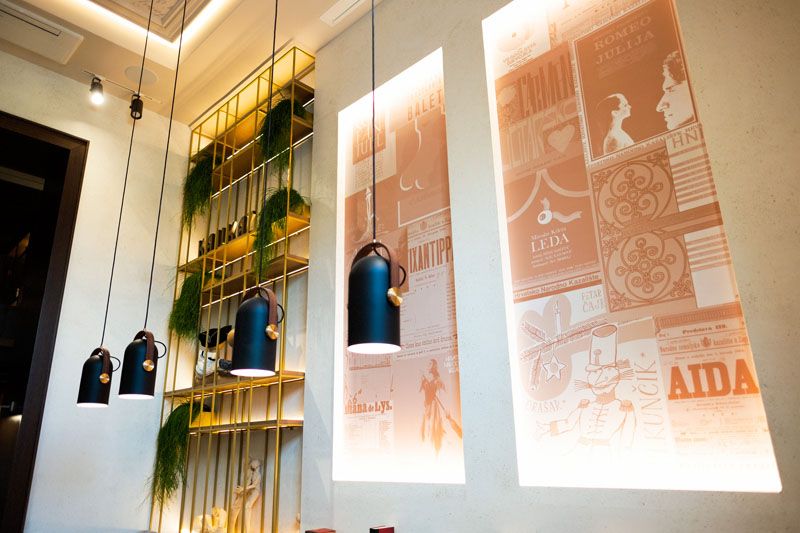
The legendary “Kavez”, as the cafe is often informally known, owes its reputation as a cultural oasis to renowned writers and artists who enjoyed spending time there: from Matoš and Ujević to Šimić and Krleža, but also to the fact that it is located in the very city centre opposite the Croatian National Theatre building. Kavkaz had an important place in the more recent history as well, as part of the Kavkaz-Zvečka-Blato trio. The cafe’s popularity reached its peak just during the New Wave period in the 1980s.
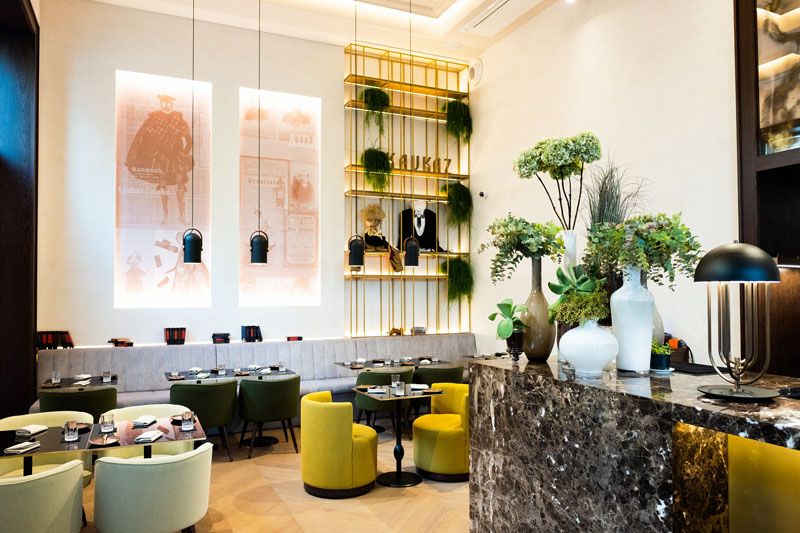
However, the cafe lost its former glory in recent years but the new owner, entrepreneur Tomislav Rajić from Zagreb, decided to change that, in cooperation with the designer and architect Mirta Mujačić Đaković. “Creating the new-old Kavkaz was a challenge, primarily because of the state it was in. Many doorways were walled up, basement and stairs were out of use... We decided to go in the direction of returning some of the architectural details from the past, opening all three floors using natural materials, with the aim of emphasizing the elegance of the entire space. We wanted to return the culture to the city, re-link the cafe with the theater and give it the significance it deserves. We also hope to encourage more similar projects throughout the city,” said Mirta Mujačić Đaković, who worked on the project together with her colleague Nika Fatović.
The strong connection with the theatre can be seen in every corner of the newly-renovated cafe – from the original Vatroslav Lisinski’s handwriting applied to the ceiling above the entrance to numerous posters from the history of the Croatian National Theatre (HNK), historical photos and original designs which decorate the walls.
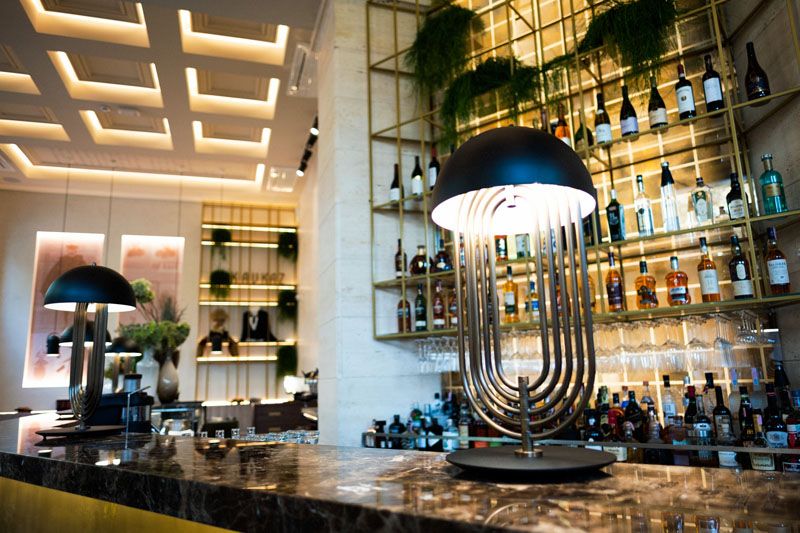
The design of visual identity and the collection of historical material from the archives of HNK and the Croatian Academy of Arts and Sciences (HAZU) were done by the expert team from theKuharić Matoš agency, which also designed the new cafe logo. “Kavkaz is one of the most important venues in the historical centre of Zagreb. Although it changed several styles in its 120-year history, it has remained carved into the cultural heritage of Zagreb as a well-known gathering place for intellectuals, artists and bohemians. Therefore, our goal was to create a visual identity that will communicate the historical legacy and connectivity with the Croatian theatre, reminding us of the golden age of Kavkaz, and recreate it into a venue that is currently the only real cafe in the city,” said Luka Kuharić, Pavao Kuharić and Bojan Matoš.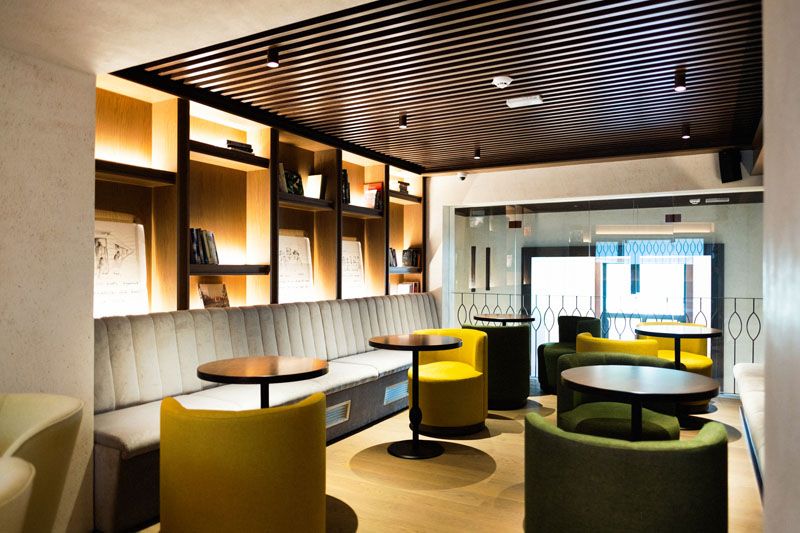
The internal and external transformation is not the only novelty in the Kavkaz concept, which has now received several new features. The 500-square-metre Kavkaz now includes a restaurant/wine bar, and the venue will host various exhibitions related to the theatre, under the leadership of renowned costume designer Dženisa Pecotić. “In addition to exhibited artifacts, such as costumes, sketches and scene models, the new features include a newly-developed area in the cellar section of the cafe called Theatrical Route, which will be used to announce opening nights at the theatre, evoke memories of some of the great performances and their authors with costume and scene elements, and welcome various artists. We have paid particular attention to waiters' dresses, which have been designed with details from the theatre curtain that means so much for all artists,” said Dženisa Pecotić.
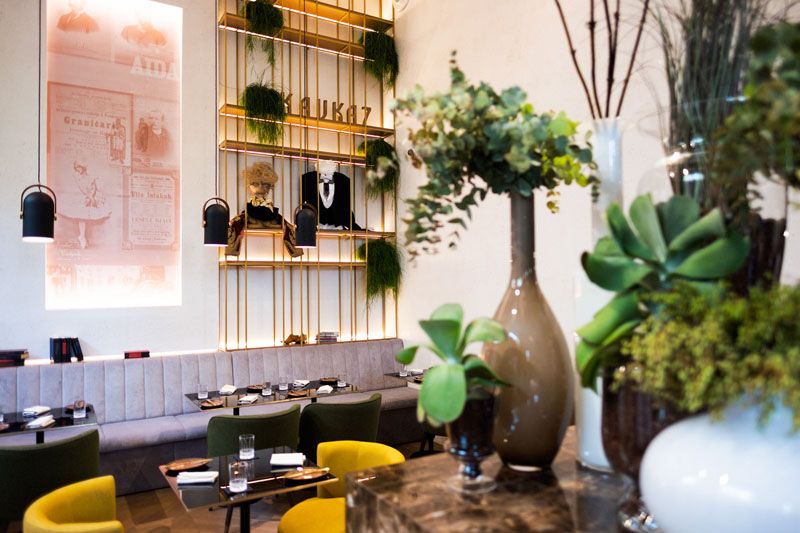
Visit the cafe at the corner of Masarykova Street and the Republic of Croatia Square and re-discover the legendary attraction of Kavkaz.
For more news on Zagreb, visit our dedicated section.
Dubrovnik Cafe and Restaurant Owners: “Town Must Consult with Experts Before Changing Rules”
Owners of catering establishments in Dubrovnik are not satisfied with the behaviour of town authorities.
With VAT Increase, Restaurants and Cafes Face Losses
Since the beginning of the year, revenues have fallen by 15 percent.
Gorski Kotar Boasts Coffee and Beer Prices From the 1990s
A beer and macchiato for 12 kuna – only in Gorski Kotar.
Cafes in Croatia to Accept Poems for Coffee
Poetry will become accepted as a means of payment across a number of cafes in Croatia later this month.
Top Split Cafe Caught Double Pricing, Offers Religious Discounts
Feeling religious and enjoy a coffee? How to save more than 50% on your coffee in one of Split's top cafes.


